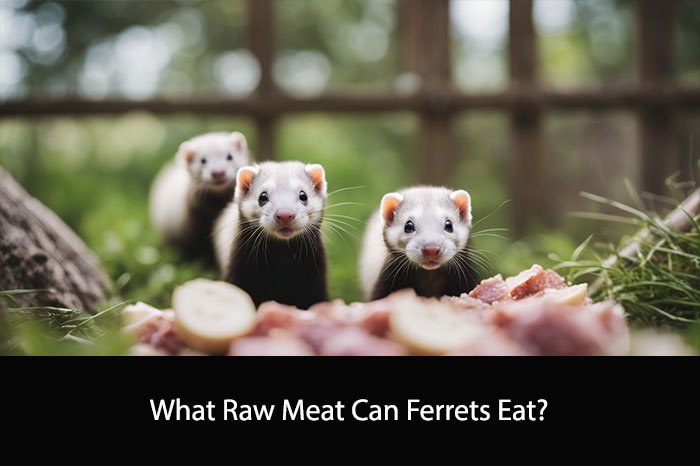Ferrets are obligate carnivores, meaning they require a diet rich in animal protein to thrive. While most ferret owners opt for commercial ferret food, some prefer to feed their pets a raw meat diet. Raw feeding is a controversial topic among ferret owners, with some claiming it provides numerous health benefits while others argue it poses risks such as bacterial infections.

When it comes to raw feeding, it’s important to know which meats are safe for ferrets to consume. While ferrets can eat a variety of meats, not all are suitable for their digestive systems. Additionally, certain meats may contain harmful bacteria or parasites that can make ferrets sick.
In this article, we will explore the topic of raw feeding for ferrets and answer the question, “what raw meat can ferrets eat?” We will provide a comprehensive list of safe meats for ferrets to consume and discuss the potential benefits and risks of a raw diet for these carnivorous pets.
What Raw Meat Can Ferrets Eat

Ferrets are obligate carnivores, which means their diet should consist mainly of meat. Raw meat is a great source of protein and essential nutrients for ferrets. However, not all types of raw meat are safe for ferrets to eat. Here are some of the raw meats that ferrets can safely consume:
- Chicken: Ferrets can eat raw chicken, including the bones and skin. Chicken is a great source of protein and is easily digestible for ferrets. However, make sure to remove any excess fat from the chicken before feeding it to your ferret.
- Turkey: Similar to chicken, ferrets can eat raw turkey meat, bones, and skin. Turkey is a good source of protein and is a great alternative to chicken.
- Beef: Ferrets can consume raw beef, but it should be lean and free of any excess fat. Beef liver is also a good source of vitamin A for ferrets.
- Lamb: Raw lamb meat is a good source of protein and is safe for ferrets to eat. However, it should be lean and free of any excess fat.
- Rabbit: Ferrets can eat raw rabbit meat, including the bones and organs. Rabbit meat is a great source of protein and is easily digestible for ferrets.
It’s important to note that raw meat should always be handled and stored properly to prevent the risk of bacterial contamination. Always wash your hands and any utensils used to prepare raw meat before and after handling. Additionally, make sure to purchase raw meat from a reputable source to ensure its quality and safety.
In summary, ferrets can safely consume a variety of raw meats, including chicken, turkey, beef, lamb, and rabbit. However, it’s important to handle and store raw meat properly to prevent bacterial contamination.
Ferret Dietary Basics
Nutritional Requirements
Ferrets are obligate carnivores, which means they require a diet that is high in animal protein and fat. They have a short digestive tract, and their bodies are designed to digest and absorb nutrients from animal-based foods. Ferrets have specific nutritional requirements that must be met to ensure their health and wellbeing.
A balanced ferret diet should consist of high-quality animal-based protein, fat, and essential nutrients. Some of the key nutrients that ferrets require include taurine, vitamin A, and essential fatty acids. These nutrients are essential for maintaining a healthy immune system, healthy skin and coat, and good vision.
Benefits of Raw Meat Diet
A raw meat diet can provide many benefits for ferrets. Raw meat is rich in animal-based protein and fat, which are essential for maintaining a healthy weight and muscle mass. It also contains essential nutrients that ferrets require, such as taurine, vitamin A, and essential fatty acids.
A raw meat diet can also help to promote healthy teeth and gums. Chewing on raw meat can help to remove plaque and tartar buildup, which can reduce the risk of dental problems. Additionally, a raw meat diet can help to reduce the risk of digestive problems and improve overall digestive health.
When feeding ferrets a raw meat diet, it is important to ensure that the meat is fresh and of high quality. It should be sourced from a reputable supplier and handled and stored properly to reduce the risk of bacterial contamination.
In conclusion, a balanced diet that meets the nutritional requirements of ferrets is essential for their health and wellbeing. A raw meat diet can provide many benefits for ferrets, but it is important to ensure that the meat is of high quality and handled and stored properly to reduce the risk of bacterial contamination.
Safe Raw Meats for Ferrets

Ferrets are obligate carnivores, which means they require a diet that is high in protein and fat. Raw meat is a great source of these nutrients, but not all types of raw meat are safe for ferrets to consume. Here are some safe raw meat options for ferrets:
Poultry Options
Chicken, turkey, and quail are all safe options for ferrets to eat. Make sure the meat is fresh and free from any additives or seasoning. Remove any bones and skin before feeding the meat to your ferret.
Red Meat Selections
Beef, lamb, and venison are all safe red meat options for ferrets. Again, make sure the meat is fresh and free from any additives or seasoning. Remove any bones and fat before feeding the meat to your ferret.
Fish Varieties
Fish can be a great source of omega-3 fatty acids for ferrets, but not all types of fish are safe for them to eat. Safe options include salmon, trout, and sardines. Make sure the fish is fresh and free from any additives or seasoning. Remove any bones before feeding the fish to your ferret.
It is important to note that while raw meat can be a nutritious addition to a ferret’s diet, it should not be the sole source of their nutrition. A balanced diet that includes a variety of protein sources, as well as fruits and vegetables, is essential for a healthy ferret. Always consult with a veterinarian before making any changes to your ferret’s diet.
Unsafe and Toxic Foods
Harmful Meats
Ferrets are obligate carnivores and require a diet that is high in protein. However, not all meats are safe for ferrets to consume. Raw meat, in particular, can be dangerous for ferrets. Raw meat can contain harmful bacteria, such as Salmonella and E. coli, which can cause serious health issues in ferrets.
Some of the meats that are toxic to ferrets include:
- Raw pork: Raw pork contains a parasite called Trichinella spiralis, which can cause trichinosis in ferrets. This can lead to muscle pain, fever, and even death.
- Raw fish: Raw fish can contain thiaminase, an enzyme that breaks down thiamine (vitamin B1). A deficiency of thiamine can cause neurological problems in ferrets.
- Raw poultry: Raw poultry can contain harmful bacteria, such as Salmonella and E. coli, which can cause serious health issues in ferrets.
Dangerous Food Items
Apart from meats, there are several other food items that are toxic to ferrets. These include:
- Chocolate: Chocolate contains theobromine, which can be toxic to ferrets. Even a small amount of chocolate can cause vomiting, diarrhea, and seizures in ferrets.
- Caffeine: Caffeine can cause restlessness, rapid breathing, heart palpitations, and muscle tremors in ferrets. It can also be fatal in high doses.
- Onions and garlic: Onions and garlic contain compounds that can damage the red blood cells in ferrets, leading to anemia.
- Grapes and raisins: Grapes and raisins can cause kidney failure in ferrets.
It is important to note that this is not an exhaustive list, and there may be other foods that are toxic to ferrets. As a general rule, it is best to avoid feeding ferrets any human food, and to stick to a diet that is specifically formulated for ferrets.
Preparing Raw Meat for Ferrets
Handling and Storage
When preparing raw meat for ferrets, it is important to follow proper handling and storage procedures to ensure the safety of both the ferret and the owner. Raw meat should be handled with clean hands and utensils to avoid contamination. It is recommended to use separate cutting boards and utensils for raw meat and other foods to prevent cross-contamination.
Raw meat should be stored in the refrigerator at a temperature of 40°F or below. It is important to consume or freeze the meat within a few days of purchase to prevent spoilage. Ferret owners should also be cautious of meat that has been previously frozen, as it may have lost some of its nutritional value.
Portion Sizes and Feeding Frequency
When feeding raw meat to ferrets, it is important to provide appropriate portion sizes and feeding frequency. Ferrets have a high metabolism and require a diet that is high in protein and fat. A good rule of thumb is to feed a ferret approximately 5-7% of its body weight in raw meat each day.
It is recommended to feed ferrets two to three times per day, with a maximum of four times per day for young or active ferrets. Owners should monitor their ferret’s weight and adjust portion sizes accordingly to maintain a healthy weight.
In conclusion, preparing raw meat for ferrets requires proper handling and storage to ensure safety, as well as appropriate portion sizes and feeding frequency to meet their nutritional needs. Ferret owners should consult with their veterinarian to determine the best diet for their individual ferret.
Transitioning to a Raw Diet
Transitioning a ferret to a raw diet can be done gradually to ensure that the ferret’s digestive system can adjust to the new diet. It is important to note that ferrets are obligate carnivores and require a diet that is high in protein and fat.
Gradual Introduction
When transitioning a ferret to a raw diet, it is recommended to start with small amounts of raw meat mixed with their regular food. This can be done over the course of a week, gradually increasing the amount of raw meat and decreasing the amount of regular food.
It is important to monitor the ferret’s stool during this process to ensure that they are not experiencing any digestive issues. If the ferret experiences diarrhea or other digestive issues, it is recommended to slow down the transition process or consult with a veterinarian.
Monitoring Health Changes
As with any change in diet, it is important to monitor the ferret’s health during the transition to a raw diet. It is recommended to keep track of their weight, stool consistency, and overall energy levels.
If the ferret experiences any negative health changes, such as lethargy or a decrease in appetite, it is recommended to consult with a veterinarian. It is also important to ensure that the ferret’s raw meat is fresh and properly stored to prevent any potential health issues.
Overall, transitioning a ferret to a raw diet can be done gradually with proper monitoring and care. It is important to ensure that the ferret’s nutritional needs are being met and that any potential health issues are addressed promptly.
Supplementation and Variety
Vitamin and Mineral Supplements
While raw meat is an excellent source of protein and fats for ferrets, it may not provide all the necessary vitamins and minerals for their optimal health. Therefore, it is recommended to supplement their diet with appropriate vitamins and minerals. Ferret-specific supplements are readily available in pet stores and online, and they are formulated to meet the specific nutritional needs of ferrets.
Some of the essential vitamins and minerals that ferrets require include vitamin A, vitamin D, vitamin E, taurine, calcium, and phosphorus. These nutrients are necessary for maintaining healthy skin and coat, strong bones, and a robust immune system. Therefore, it is crucial to ensure that your ferret’s diet is well-balanced and supplemented with the necessary vitamins and minerals.
Incorporating Variety
In addition to vitamin and mineral supplements, ferrets also require variety in their diet to ensure they receive all the necessary nutrients. Feeding them the same type of raw meat every day may lead to nutrient deficiencies and health problems. Therefore, it is recommended to offer them a variety of raw meats, such as chicken, beef, lamb, and fish.
Furthermore, incorporating organ meats, such as liver and heart, can provide essential vitamins and minerals that are not found in muscle meat. Ferrets are also known to enjoy eggs, which are an excellent source of protein and healthy fats. It is essential to rotate the types of raw meat and other foods to ensure that your ferret’s diet is varied and nutritionally complete.
Overall, supplementation and variety are crucial components of a healthy raw meat diet for ferrets. By providing them with the necessary vitamins and minerals and incorporating a variety of raw meats and other foods, you can ensure that your ferret is healthy and thriving.
Veterinary Care and Diet Oversight
It is important to note that while ferrets can eat raw meat, they still require veterinary care and diet oversight. A ferret’s diet should consist of a balance of protein, fat, and carbohydrates, and the amount and type of meat they consume should be monitored.
When feeding raw meat to a ferret, it is crucial to ensure that it is fresh and of high quality. Any meat that appears discolored, has a foul odor, or has been sitting out for an extended period should not be given to a ferret. Additionally, the meat should be thoroughly washed and prepared to prevent any potential bacterial contamination.
Ferrets should also have access to fresh water at all times, as dehydration can lead to serious health issues. Owners should monitor their ferret’s water intake and make sure they are drinking enough.
Overall, while raw meat can be a part of a ferret’s diet, it is important to consult with a veterinarian and provide proper diet oversight to ensure that the ferret is receiving all necessary nutrients and staying healthy.
Frequently Asked Questions
Which types of raw meat are safe for ferrets to consume?
Ferrets can consume a variety of raw meats, including chicken, turkey, beef, lamb, and pork. It is important to ensure that the meat is fresh and of high quality, as spoiled meat can cause gastrointestinal issues and other health problems for ferrets.
How frequently should ferrets be fed raw meat?
Raw meat should not be the sole component of a ferret’s diet, but rather a supplement to their regular food. It is recommended to feed raw meat to ferrets once or twice a week, in small portions. Overfeeding raw meat can lead to obesity and other health problems.
Are there any meats that ferrets should avoid?
Ferrets should avoid consuming raw fish, as it contains an enzyme that destroys thiamine, an essential B vitamin. Additionally, ferrets should not consume raw pork liver, as it contains high levels of vitamin A, which can be toxic in large quantities.
Can ferrets have freeze-dried meats as part of their diet?
Freeze-dried meats can be a convenient and healthy addition to a ferret’s diet. However, it is important to ensure that the freeze-dried meat is of high quality and does not contain any additives or preservatives that could be harmful to ferrets.
Is it necessary to supplement a ferret’s diet when feeding them raw meat?
Raw meat alone does not provide a balanced diet for ferrets, as it lacks essential nutrients such as taurine and calcium. It is important to supplement a ferret’s diet with appropriate amounts of these and other nutrients to ensure their overall health and wellbeing.
What should be considered when creating a balanced raw diet for ferrets?
When creating a balanced raw diet for ferrets, it is important to consider their specific nutritional needs. A balanced diet should include appropriate amounts of protein, fat, and carbohydrates, as well as essential vitamins and minerals. It is recommended to consult with a veterinarian or a ferret nutritionist to ensure that a ferret’s diet is properly balanced.





